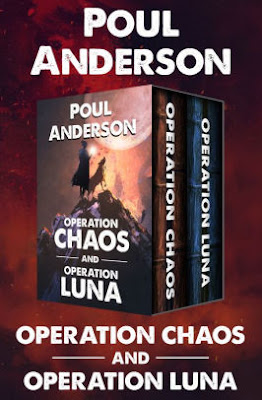Operation Luna, 37.
This chapter begins:
"Now the story splits again, three ways this time. I'll have to reconstruct two of them from what information came to me later, most of it brokenly, and the best guesses I can make." (p. 332)
A possible although cumbersome way to recount three concurrent narratives would be to divide a page or a computer screen into three parallel columns. No one is likely to do this, of course. In a tetralogy of TV plays about a husband and wife and their son and daughter, the son was seen to walk out of the kitchen in one episode and to walk into the hallway in another episode (etc). In a comic strip series by Alan Moore, two episodes were set in adjoining hotel rooms and a character who shouted in one panel of one episode was heard in the corresponding panel of the other episode. Several stories in Robert Heinlein's Future History overlap chronologically as do some stories in Anderson's Technic History. Fiction writers should sometimes make us aware of simultaneous events.
Matuchek continues:
"Nor may I say much about my own experiences. They're branded on my memory, but I gave my word of honor I'd keep certain things secret." (ibid.)
But first person narrators, including Matuchek himself, do sometimes divulge information that is supposed to be secret. Matuchek tells us his daughter's real name although real names are kept secret for magical reasons. Such imparting or withholding of confidential information generates some major anomalies in Dornford Yates' novels.

1 comment:
Kaor, Paul!
Sometimes, when Matuchek imparts to us information he had previously called confidential, I think what happened in some, not all, cases was him THINKING of information he did not plan to reveal. We are to understand such cases as moments when we are "in" his mind, seeing what Steven thinks or thought. Information he had not, in fact revealed.
Ad astra! Sean
Post a Comment